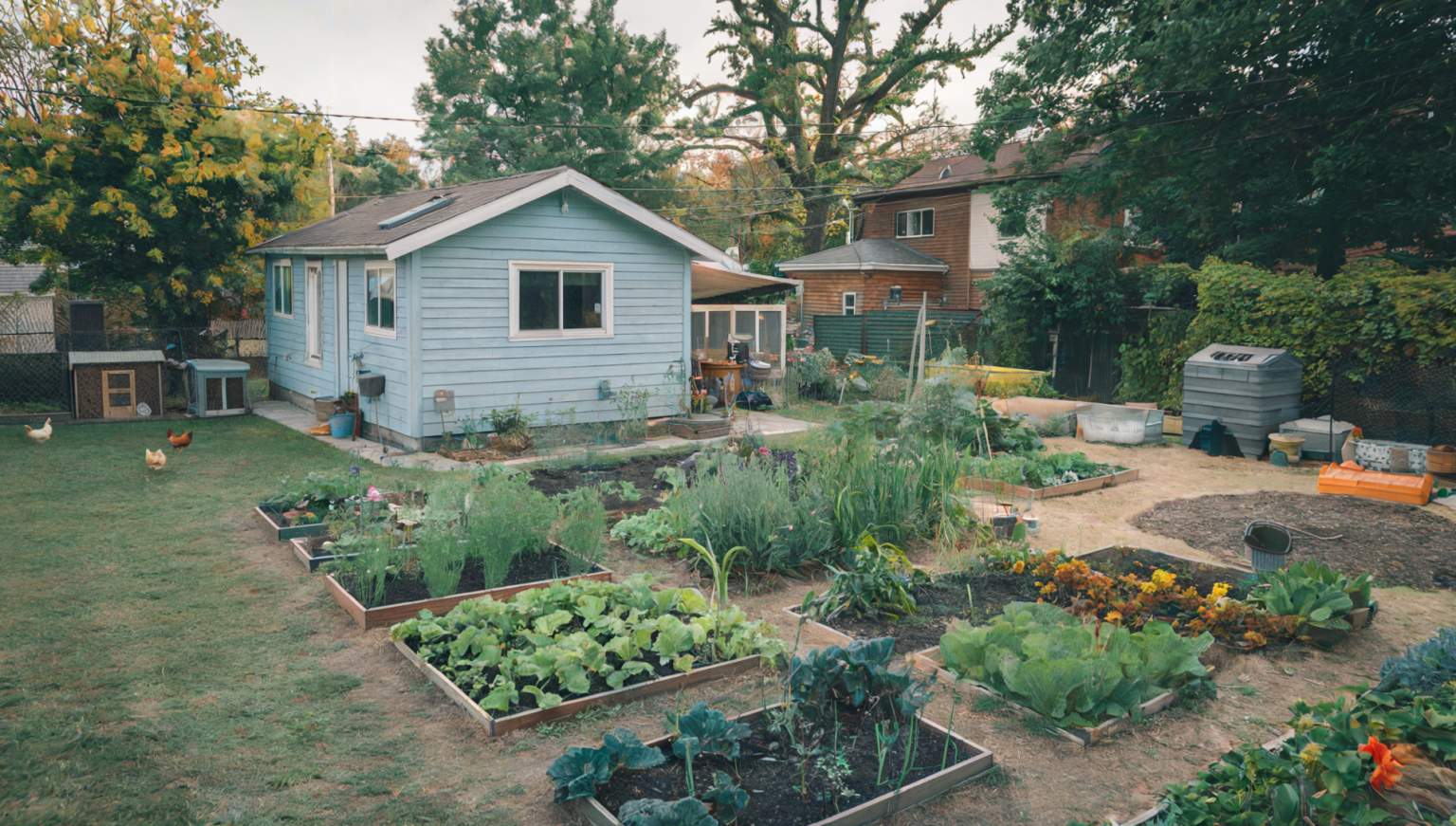In the heart of bustling cities, a movement toward simplicity is thriving: urban homesteading. It’s a modern twist on age-old practices, allowing city dwellers to embrace self-sufficiency, even in the midst of skyscrapers.
Urban homesteading encourages us to rediscover hands-on skills, from gardening in small spaces to crafting household items. It’s a step toward a mindful lifestyle, where each meal, item, or project reflects a personal touch and a commitment to self-reliance.
While homesteading might bring to mind vast farmlands and rural homesteads, it’s possible—and incredibly rewarding—to adopt these practices in urban environments. The versatility of homesteading means it can be scaled to fit apartments, terraces, and shared spaces. Urban homesteading also fosters a closer connection to nature with the same fulfilling rewards as any larger homestead.
You can reduce waste to saving on grocery bills and promote health by emphasizing fresh, homegrown produce and chemical-free products in any city. Plus, creating, growing, and crafting for oneself is a lifestyle of abundance and wellness.
And it doesn’t stop there — each of the following paths, offers many ways to introduce novel backyard business ideas!
1. Begin with Small-Space Gardening
No matter your space, small-space gardening brings nature into your life, offers fresh, homegrown produce, and a chance to connect with your surroundings. Even a single pot can transform a window ledge or balcony, proving that the joy of growing your own garden fits anywhere, any size.
Container Gardening: Herbs, Veggies, and Flowers on Balconies and Patios
Container gardening makes it easy to transform small spaces into lush green havens. Whether it’s pots on a balcony or planters by a windowsill, you can grow a surprising variety of plants—herbs like basil and thyme, vegetables like peppers, and flowers for pollinators. Small, manageable containers let urban gardeners experiment with crops and beautify their spaces with greenery, adding life to even the smallest apartment.
Vertical Gardens and Wall Planters: Making Use of Every Inch
For those with limited space, vertical gardens and wall planters are game-changers. A variety of gardening containers use shelving, racks, or mounted containers to make the most of any sunny wall. These gardens are perfect for growing everything from leafy greens to strawberries, offering city dwellers the chance to produce more in less space.
Choosing the Right Plants for Urban Spaces and Low-Light Areas
Urban gardeners often face unique challenges, like limited sunlight. Selecting shade-tolerant plants or those suited to partial light, such as lettuce, spinach, and mint, can ensure success. By choosing the right plants, even low-light areas can become productive spots that add greenery and freshness to any urban home.
2. Composting in the City
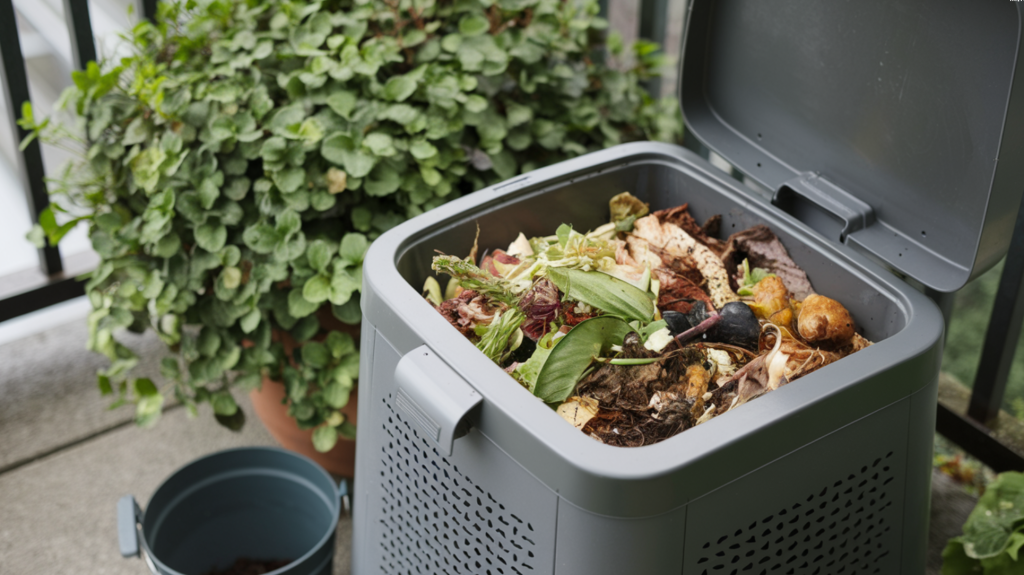
Composting is a powerful step toward sustainability, whether on a sprawling homestead or a small city balcony. By transforming food scraps into rich soil, you reduce waste, nourish plants, and help the planet—all in your own space. Start composting today; every small contribution makes a lasting impact.
Simple Ways to Start a Compost Bin on Your Balcony or Patio
Composting is a fantastic way to reduce kitchen waste and create nutrient-rich soil for your small-space gardens. With compact compost bins designed for urban spaces, you can easily compost food scraps on your balcony or patio. Just a few small buckets, a mix of greens and browns, and a little patience can turn everyday waste into valuable garden gold.
Indoor Composting with Worm Bins: How to Do it Odor-Free
For those without outdoor space, indoor worm bins are an ideal solution. Worm composting, or vermiculture, is a clean, odor-free way to compost indoors. The worms break down food scraps quickly, creating rich soil for your plants. These small bins are simple to maintain and make composting accessible for apartment dwellers.
Benefits of Composting: Reducing Waste and Enriching Garden Soil
Composting cuts down on kitchen waste, keeping it out of landfills while enriching soil for gardens. The end product is a dark, nutrient-packed compost that boosts plant growth, making it a valuable resource for urban gardeners.
3. Preserving and Canning Your Own Food
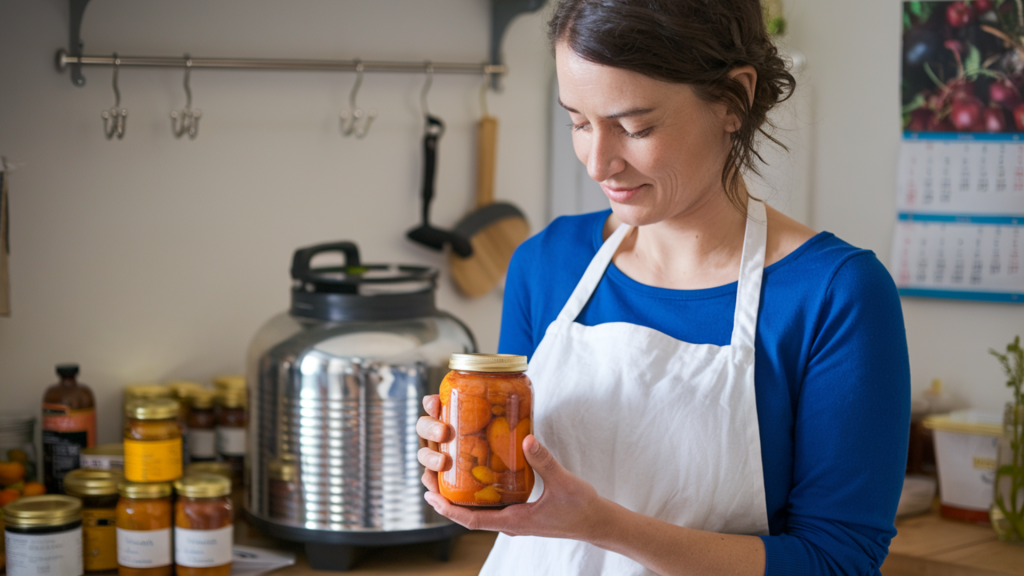
A typical downside of living in the city is the extra cost — from higher property taxes to higher expenses for goods and services. Preserving and canning your own food can not only offset higher costs, you are ensuring that you can savor each season’s flavors year-round. Start small, gain confidence, and enjoy the satisfaction of stocking your pantry with delicious, home-prepared foods.
A Beginner’s Guide to Canning: Essential Tools and Techniques
Canning extends the life of fresh produce, allowing urban homesteaders to enjoy seasonal fruits and veggies all year. Essential tools like mason jars, a large pot, and a canning rack make it easy to start. Water bath canning is a beginner-friendly method that’s ideal for preserving jams, pickles, and sauces, keeping summer flavors alive through winter.
Pickling, Fermenting, and Drying: Preserving Flavor Year-Round
Beyond canning, pickling and fermenting are excellent ways to preserve produce. Pickling brings a tangy twist to vegetables, while fermenting creates probiotic-rich foods that support gut health. Drying is another method that extends shelf life, perfect for herbs and fruit leathers.
Top Tips for Storing Canned Goods in Small Urban Spaces
In urban spaces, creative storage solutions are key. You don’t need a root cellar; stash your canned goods under beds, in closets, or on shelves, labeling them for easy access. Small-space storage can be a challenge, but with efficient organization, you can enjoy the fruits of your labor without clutter.
4. Raising Small Livestock Where Possible
Starting with small livestock, like chickens or rabbits, brings fresh food, natural fertilizer, and a connection to nature—even in the city. Raising animals, where possible, enhances self-sufficiency and adds life to any space. No matter your property size, it’s a rewarding journey worth exploring.
Exploring Your City’s Guidelines on Chickens, Rabbits, and Bees
In some urban areas, small livestock like chickens, rabbits, or even bees are allowed. Check city guidelines to understand any restrictions or requirements. Chickens can provide fresh eggs, while rabbits are excellent for producing garden-enriching manure. Bees are valuable pollinators, making them beneficial additions to urban homesteads.
Benefits of Backyard Chickens: Fresh Eggs and Garden Fertilizer
Backyard chickens are a great source of fresh eggs and natural fertilizer. They recycle food scraps, enrich soil, and bring a sense of liveliness to a home garden. Raising a small flock can be a rewarding experience that brings your urban homestead one step closer to self-sufficiency.
Urban Beekeeping: Supporting Local Pollination and Harvesting Honey
Beekeeping in urban spaces is increasingly popular, as bees support local pollination and produce honey. Small hives are manageable in city environments, providing delicious, homegrown honey and helping to strengthen the local ecosystem.
5. Creating Natural, DIY Cleaning Products

It’s essential while living in the city to reduce your exposure to toxins wherever possible. By creating your own cleaning products, you can control the ingredients, creating a safer home while saving money. These simple changes reduce waste, limit chemicals, and give you practical, personalized solutions—no large space required, just a commitment to cleaner living!
Essential Ingredients for DIY Cleaners: Vinegar, Baking Soda, and Essential Oils
Making your own cleaning products is simple and cost-effective, using ingredients like vinegar, baking soda, essential oils, and castile soap like Dr. Bronner’s. These non-toxic cleaners have dozens of uses and are powerful and eco-friendly, reducing household chemicals and saving money.
Simple Recipes for Non-Toxic, Eco-Friendly Cleaners
DIY recipes for all-purpose cleaner, glass cleaner, and floor cleaner are easy to make. Mixing organic apple cider vinegar with water and a few drops of essential oils creates a multipurpose cleaner that cuts through grime while leaving a fresh scent. Baking soda’s scrubbing power works wonders for tough spots and leaves surfaces sparkling. This video explains the basics:
Reducing Plastic Waste by Reusing Containers and Bottles
Upcycling containers for DIY cleaners reduces plastic waste, giving bottles a second life. Refillable spray bottles and glass jars are ideal for storing homemade solutions, making every cleaning session a step toward sustainability.
6. Water Conservation Tips for Urban Homesteaders
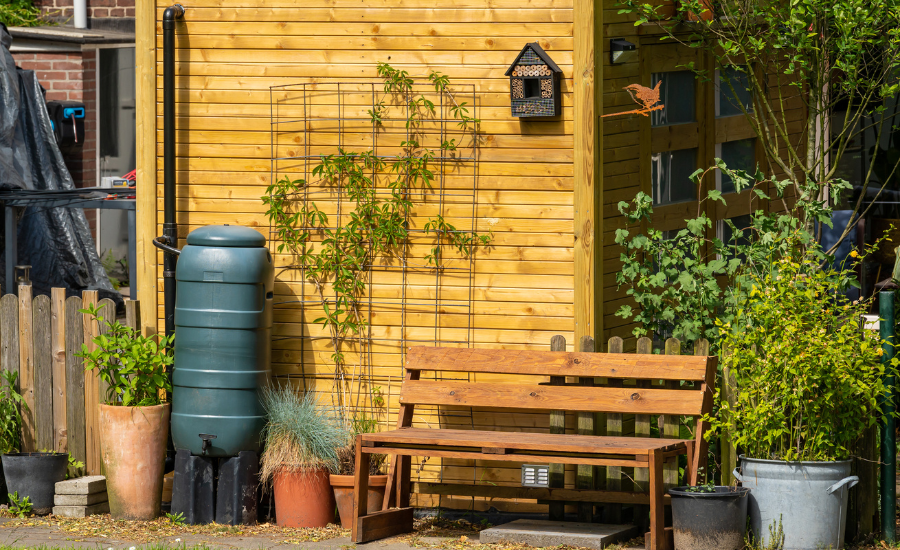
Every drop counts, especially in urban spaces. Whether you live in a cozy apartment or a small townhouse, water conservation will help you maintain cleaner water and reduce the bills. Simple steps like using rain barrels, greywater recycling, or water-saving fixtures make a meaningful impact, proving every urban homesteader can help preserve the most precious resource.
Harvesting Rainwater: Creative Solutions for Limited Spaces
Rainwater harvesting can be adapted for urban spaces with compact containers. Small rain barrels or even repurposed buckets collect water for garden use, offering a free, eco-friendly resource for urban homesteaders.
How to Recycle Greywater for Your Garden
With a simple greywater system, water from showers or sinks can be repurposed to irrigate plants. Small filters make it safe for non-edible plants, providing a sustainable solution for garden hydration without extra water use. Always be sure to use biodegradable soap and all-natural cleaners.
Installing Water-Saving Devices: Aerators, Timers, and Efficient Faucets
Water-saving devices like aerators, timed irrigation systems, and efficient faucets reduce water use indoors and out. These small upgrades save money and conserve water, an important step for eco-conscious urban dwellers.
7. Handmade and Upcycled DIY Projects
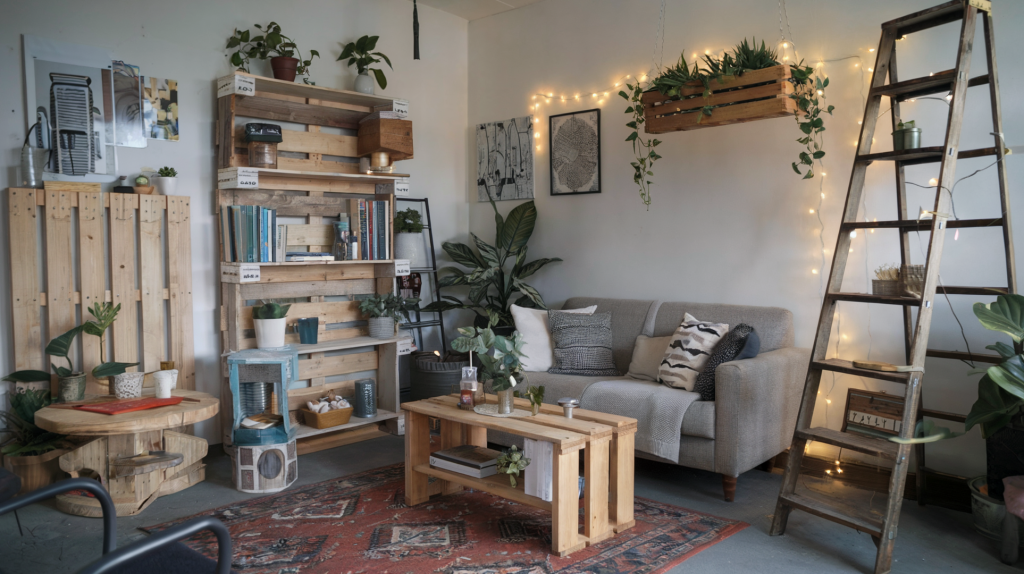
Handmade and upcycled DIY projects bring creativity and an artistic sensibility to any space, no matter the size. Whether you live in a cozy apartment or a city townhouse, every DIY project transforms your surroundings, adds personal charm, and reduces waste. Use your creativity and personality — bring that big homestead vibe right to the heart of the city!
Upcycling Furniture and Home Décor: Giving Old Items New Life
Upcycling furniture breathes new life into old items, reducing waste and adding character to your home. A coat of paint, new handles, or reupholstering can transform tired pieces into unique decor that reflects your personality.
Making Your Own Soaps, Candles, and Personal Care Products
Homemade soaps, candles, and personal care items bring a touch of luxury to daily routines. By making your own, you control the ingredients, ensuring products are natural, chemical-free, and tailored to your preferences. This will also greatly reduce allergies to harsh chemicals. Make your home smell amazing with no downside to your health!
Crafting Reusable Items: Bags, Beeswax Wraps, and Cloth Napkins
Reusable items like beeswax wraps, cloth napkins, and shopping bags reduce single-use plastic and add charm to your kitchen. Simple sewing projects or beeswax applications are easy to make, giving you practical, earth-friendly items.
Building Community Connections — Your #1 Resource
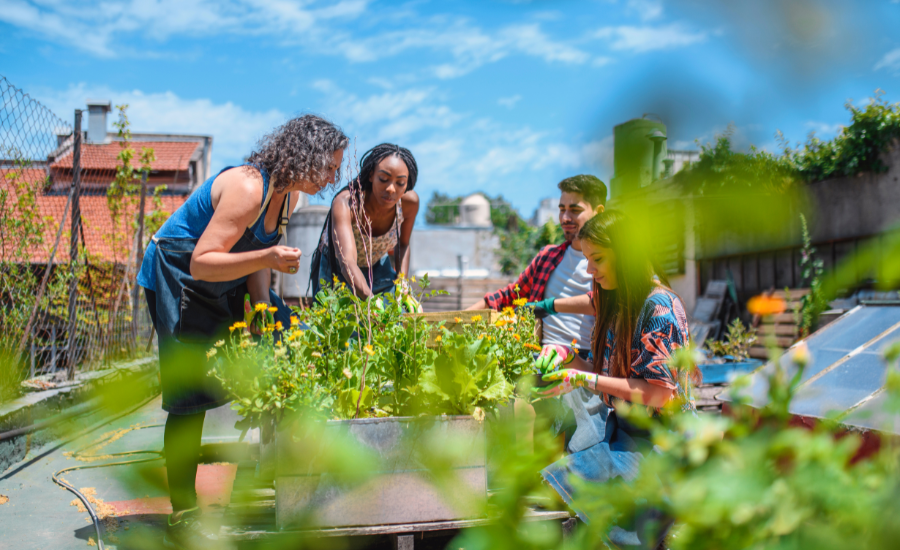
I always stress the importance of community; the great news is that it’s even easier to find in a highly populated city! Building community connections in urban homesteading fosters resilience, support, and shared knowledge.
By joining local groups, online groups, and Community Supported Agriculture programs to learn together, homesteaders create a thriving network designed for long-term growth.
Sharing resources saves money and encourages lasting participation. Seed swaps, tool shares, and skill workshops make homesteading more accessible and deepen community bonds. By collaborating, urban homesteaders strengthen their knowledge and resilience while having fun with like-minded people.
Whether you’re a beginner or experienced, homesteading with others builds a network of inspiration. Together, we can strengthen neighborhood bonds, and make self-sufficiency achievable in any city.
See Our Latest Posts
- Simple Recipes for DIY Herbal Salves and Balms
- Delicious One-Pot Homestead Meals from Pantry Staples
- 5 Best Meat Dehydrators for DIY Jerky on Amazon (2025)
- Urban Homestead Hacks from Backyard to Balcony
- Creative Strategies for Frugal Homesteading
Write A Guest Post For Us!
Are you passionate about gardening, raising livestock or preserving food? We’re excited to announce that we’re now accepting guest posts for all aspects of homesteading!
